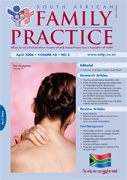Informed Consent: Over- and Under-interpretation
Abstract
Informed consent is the expression of an individual’s autonomy or selfrule. To be autonomous one has to be competent and acting freely. Ethicists make a distinction between a “thin and a “thick concept of autonomy. The thin concept of autonomy refers to “a competent person, in possession of the relevant facts making a free decision about what to do with his or her life. While, the thick concept of autonomy refers to persons possessing the capacity to act on the basis of normative reasons. In other words, we are autonomous when we act according to relevant normative considerations. In this perspective we refrain from an action because we have good reasons not to and act accordingly, and viceversa.
Section
Review Articles
By submitting manuscripts to SAFP, authors of original articles are assigning copyright to the South African Academy of Family Physicians. Copyright of review articles are assigned to the Publisher, Medpharm Publications (Pty) Ltd, unless otherwise specified. Authors may use their own work after publication without written permission, provided they acknowledge the original source. Individuals and academic institutions may freely copy and distribute articles published in SAFP for educational and research purposes without obtaining permission.

